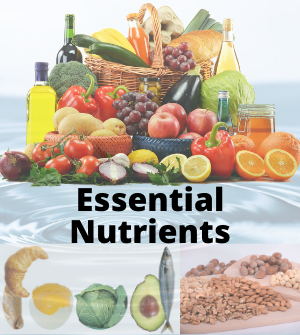
In Nutrition Basics – Part 1, we mentioned the 6 essential nutrients the body needs.
Carbohydrates (CHO), Fats, Proteins, Vitamins, Minerals and Water
It’s important that you know what these are as they are in everything you eat in one way or another. Whether you are getting enough of each nutrient is a different story. Familiarizing yourself with these nutrients will give you a jump start when planning meals and choosing foods. It may also give you a little more insight when you hear about the various fad diets that are out there.
Now let’s dig into each nutrient a bit more so you understand what they do and how you can work them into your meal plan based on need.
Carbohydrates
These are sugars or starches that provide energy to the cells and tissues.
There are two types – Simple and Complex
- Simple carbs are used quickly by the body and are found naturally in fruit, milk and milk products, but they are also found in processed and refined foods such as candy and soft drinks. [1] These are the carbs that you want to limit. Other examples of simple carb foods are white bread, pasta and rice.
- Complex carbs are the better choice of the two as they support important functions in the body such as brain function, immune system functions and digestive functions. Some examples of complex carbs are quinoa, whole grain bread, vegetables, fruits and oats.
Fats
Fats provide the body with energy as well and also help with many important functions such as cell growth, brain function, absorption of vitamins and minerals and balancing blood sugar.
I’m sure you have heard to stay away from fat, but that’s just not the case. You need fat to keep the body running properly. The key is to eat the right fats.
There are 4 types of fats that you have likely heard about:
- Monounsaturated fats – good fat – found in plant foods such as nuts, vegetable oils and avocados
- Polyunsaturated fats – good fat – found in plant and animal foods such as salmon and vegetable oils
- Saturated fats – good fat in small quantities, though this is an often debated subject – found mostly in animal foods with the exception of coconut oil.
- Trans fats – bad fat – this is definitely one to avoid. Many foods have taken these out of their ingredients, but you can still find them in some fried foods, bakery items, margarine and shortening, non-dairy creamers and a few other items. Be sure to read the labels. [2]
Proteins
Proteins are very important as they keep every cell in the body functioning properly. In addition to that, as if that’s not enough, it also helps with growth and development of muscles, bones, skin and hair among other things.
Protein can be sourced from both plants and animals, though the animal proteins are the most nutrient dense. Examples of protein sources are meat (red, poultry, fish), nuts, dairy, beans and eggs.
Vitamins
Vitamins are important to help carry out many of the functions in the body such as absorption of certain minerals and metabolizing carbs and protein.
There are two different types of vitamins – Fat Soluble and Water Soluble. The name describes the pathway to how they are used by the body.
- Fat Soluble – Vitamins A, D, E and K – This pathway is through the blood where they can be stored in the liver or fatty tissues.
- Water Soluble – All the B vitamins and vitamin C – These vitamins are easily dissolved and can be excreted through the urine.
If you have ever taken a vitamin and your urine had a very medicine like smell, there’s a good chance that you are peeing out all of the expensive vitamins you just took.
Minerals
Though these are small in size, they are big in importance. These are necessary to help the body carry out many functions.
There are two types of minerals – Major and Trace
- Major minerals – Sodium, potassium, magnesium, calcium, phosphorus, sulfur and chloride. These help balance water, improve bone health and maintain healthy skin.
- Trace minerals – There are several of these, but some that you might be most familiar with are zinc, iron, fluoride, manganese and selenium.
These are key in helping the body carry oxygen, clot blood, strengthen bones and maintain blood pressure.
Water
This is likely the most essential nutrient you need as you can only survive a couple of days without it.
We are made up mostly of water and every cell requires it to function properly. In addition, water helps flush out toxins, it helps keep the digestive system working properly and it transports nutrients.
Next Steps
You are now armed with some knowledge to begin making decisions on what you need and what foods may meet those needs. It’s always a good idea to discuss your health and dietary needs with your doctor, especially for the vitamins and minerals. It’s hard to know if you are lacking in any of these without doing a blood test.
Now that you know what the body needs to survive, what do you do with this information?
- Think about what foods you need/want to incorporate into your meal plan.
- Go shopping
- Read labels while at the grocery store to ensure you are meeting your needs
- Have fun! Don’t let all of this scientific “mumbo jumbo” scare you. You’ve got this!
[…] sugar intake – Stay away from simple carbohydrates such as candy and soda, flavored creamers for your coffee, afternoon treats, etc. The more you can […]